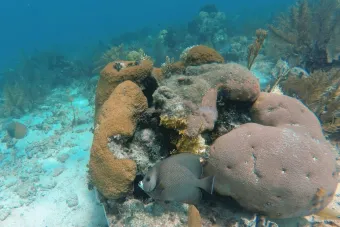
Scientists from the National Oceanography Centre (NOC) have begun a fieldwork campaign in Belizean coastal waters that will enhance understanding of the sensitivities of these fragile environments to the impacts of both human activities and climate change.
Dr Christopher Pearce, programme lead for the NOC, said “Belizean coastal environments are some of the most fragile in the world, and are facing a combination of challenges from both human and climate change factors.
In collaboration with our Belizean colleagues we will be deploying an array of state-of-the-art sensors that enable real-time monitoring of marine conditions and the stresses being placed upon them, in addition to better characterising the ecosystems at risk.”
This collaborative research program is funded by the UK Commonwealth Marine Economies (CME) Programme. It will see NOC scientists work alongside those from the Coastal Zone Management Authority and Institute (CZMAI) in Belize, the University of Belize, the Turneffe Atoll Sustainability Association (TASA), and the Belizean Port Authority.
Over the comming weeks, scientists from these institutions will work together to map the seafloor and characterise marine habitats around Belize City. They will also install ocean acidification sensors on the coral reef, which is the second longest in the world, as well as quantifying the impact of sea-level rise on carbon burial in mangrove forests. In addition, the team will characterise how changes in land-use management affect water quality in coastal environments.
The information being generated through these activities will directly contribute to a coastal zone management policy review currently being conducted by CZMAI. Therefore, they will help facilitate informed evidence-based decision-making geared towards balancing the tensions between different activities and services within the coastal zone, and conservation of the vital ecosystems services it provides.
Approximately 30% of Belize’s GDP is derived from activities that occur within the coastal zone. This is equivalent to $350 million USD per year in services to tourism, $16 million USD to fishing, and $347 million USD to coastal defence protection.
As part of the planned activities, coastal surveys will be conducted using an autonomous boat, which is part of the CAMEL facility of portable marine equipment (Containerised Autonomous Marine Environmental Laboratory). This facility also includes a mini Remotely Operated Vehicle (ROV) that will be used to visually assess the impact of changing ocean quality on the health of coral reefs in the area.
The UK Government-funded CME programme has delivered world leading expertise in marine science since 2016 through a strategic partnership of the NOC, the United Kingdom Hydrographic Office (UKHO), and the Centre for Environment, Fisheries and Aquaculture Science (CEFAS). By collecting data, undertaking scientific research and delivering state-of-the-art capacity building, the programme aims to support Commonwealth Small Island Developing States (SIDS) to sustainably manage and use their marine resources.
Activities culminate in Belize’s Coastal Awareness Week; a series of public engagement events led by CZMAI in their efforts to support the sustainable use and development of coastal resources. This years’ theme of “Building coastal resilience through innovation” will highlight the role of technology in the protection and management of Belize’s coastline, and will feature several of the instruments and sensors being deployed by the NOC.